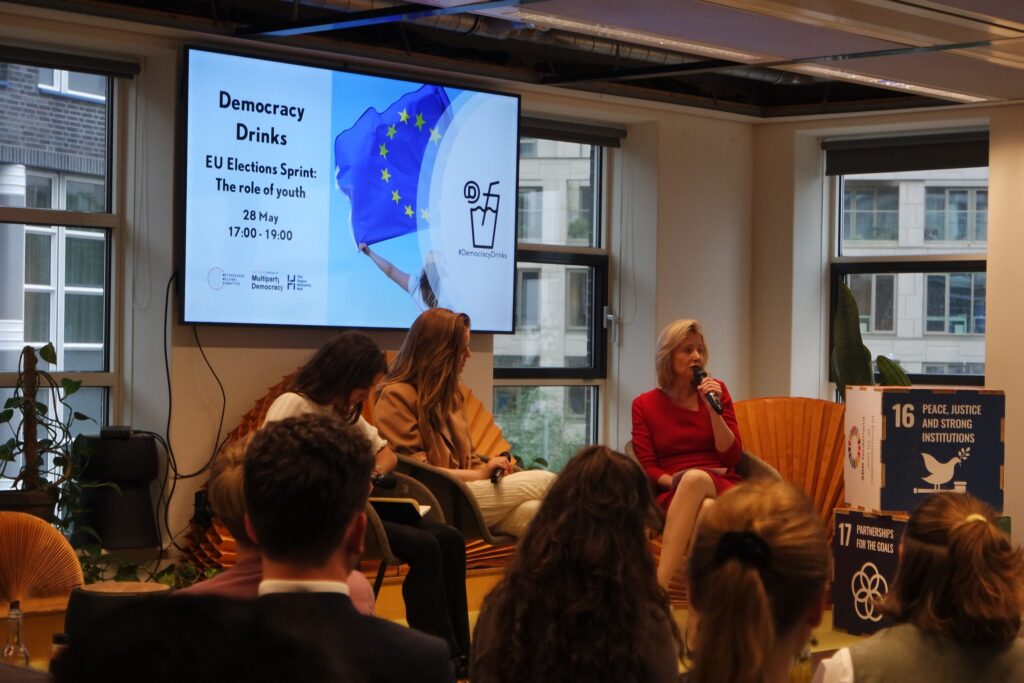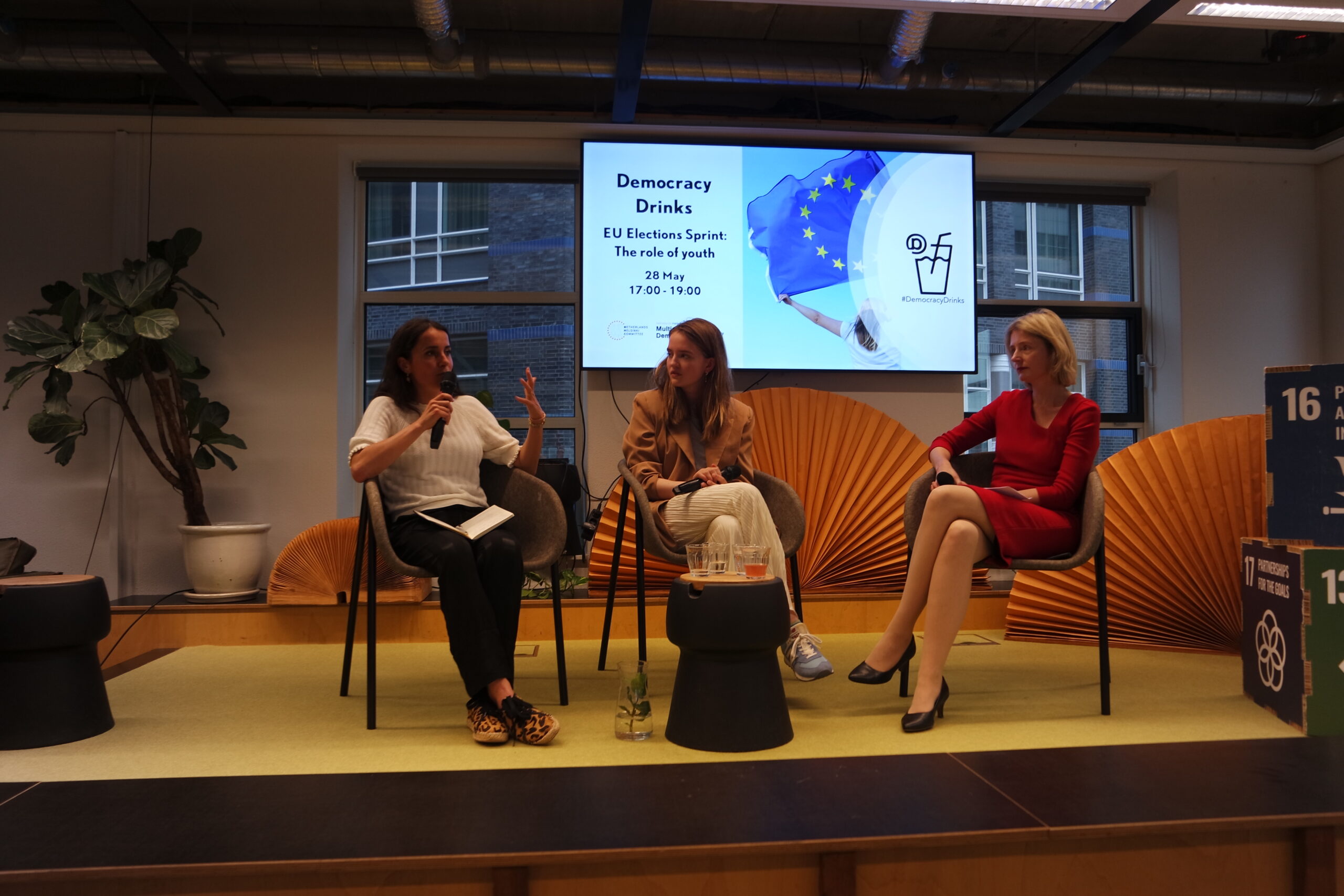#DemocracyDrinks: The EU elections sprint, the role of youth

As the EU elections machine has been gearing up for 6 June, for the candidates and the many people working on oiling its joints, the lead-up to the elections “has felt more like a marathon than a sprint.” Shared Femke Brouwer as she opened the #DemocracyDrinks the Hague event last week.
Femke is NIMD parliamentary expert and current candidate for the European elections for GroenLinks-PvdA. She moderated the #DemocracyDrinks discussion on 28 May between fellow candidate Roos Habets from the Volt party and Lotte Prins, international affairs board member for the Dutch National Youth Council. Together, we delved into the topic of youth in relation to the EU elections.
From tomorrow until 9 June, citizens from all over the EU will head to the polling stations to vote in the European Parliament elections. But how many youth will vote?
Youth make up 16.3% of the European Union and are an important deciding factor in the future of the EU’s political landscape. However, despite an increase of 14% in young people’s turnout in the 2019 EU elections, turnout remains low.
At the same time, the speakers agreed that young people are very active in the informal political spheres, dominating political activism and civic engagement, such as demonstrations or online engagement.
How can we translate the desire to participate towards higher voter turnout during the EU elections? How can we develop approaches that address and engage the participation of youth? Participation, however, goes beyond voter turnout and beyond just the polls. How can we ensure that young people are heard and have a voice during the EU elections and later in the EU Parliament?
These questions were posed to Roos and Lotte and discussed further during the Q&A of the #DemocracyDrinks. Co-hosted by NIMD, the Netherlands Helsinki Committee, and The Hague Humanity Hub, #DemocracyDrinks the Hague is a monthly networking event that brings together fellow thinkers, advocates, and enthusiasts in pro-democracy spaces. Will we see you at the next one?

But how do you engage youth?
“It is about listening, showing that their voices are heard,” the speakers said during the event. To motivate youth to vote, they must feel heard and that their vote matters.
Lotte shared that the Dutch National Council – together with ProDemos – organizes election festivals in schools across the Netherlands to close the communication gap. During these events, the youth can engage with current candidates and ask them questions, and they can participate in games to gain more knowledge about the EU and its many ins and outs. But they can also, as Lotte shared – Klaag Maar Raak. Loosely translated to ‘Complain all you want.’ During this exercise, the students can express their worries, concerns, and doubts about the EU elections and how they affect their futures. Lotte shared that the complaints varied from my driver’s license being too expensive to how I would be able to afford a home.
Freshen up the EU elections
The event also discussed how to freshen up the EU elections, engage young constituents, and, more importantly, engage the diverse groups that make up the youth. Roos shared that Volt uses innovative campaigning to grab the attention of youth.
Whilst diversifying partnerships is a method NJR uses, shares Lotte, from working with Tinder to engaging youth to vote to organize a partnership with Ben and Jerry’s – a vote for ice cream. After voting, if you hand in your red pencil at one of the 5 designated locations in the Netherlands, you will receive a free pint of Ben and Jerry’s ice cream.
A question of support
However, while we see an increase in youth engaging in politics informally, for example, through activism, the number of youths engaged formally in politics still needs to grow. Why is that?
Roos, as well as Femke, shared with the audience that a threshold for entering politics was the high level of hate that politicians receive, where women too often receive the lion’s share.
Is it then a question of support for young politicians? How does this look? Does Roos feel supported? This was the question that former MEP and current NIMD Executive Director Thijs Berman asked Roos during the Q&A. Drawing on his own experience as a young politician, he shared that back in the day as an MEP, there were no formal support structures—in other words, it was sink or swim. But how is the situation now?
Roos responded that the youth now receive support from different area. From within the parties through the training academies that most parties offer, by older MEPs, but also among the youth themselves.
Roos added, however, that it was helpful to have support systems that operate outside of politics, family members of close friends that are perhaps not as involved, and can offer the sometimes much needed outsider perspective.
During the event it became evident that fostering a supportive and engaging environment for youth in politics requires not only innovative approaches like a vote for a pint of ice cream, but also a strong sense of community and collaboration.
About #DemocracyDrinks
Originating in Brussels and the brainchild of Defend Democracy, #DemocracyDrinks are a monthly gathering freedom-loving citizens; an informal networking event that attracts a lively mixture of people from NGOs, international institutions, think tanks, national governments and representations, academia, public affairs consultancies, social businesses and active citizens.
#DemocracyDrinks are currently organized in cities around the world. Here in The Hague, Democracy Drinks are organized by The Hague Humanity Hub, the Netherlands Institute for Multiparty Democracy and the Netherlands Helsinki Committee. Follow our social media channels and Eventbrite page for more details on upcoming editions.